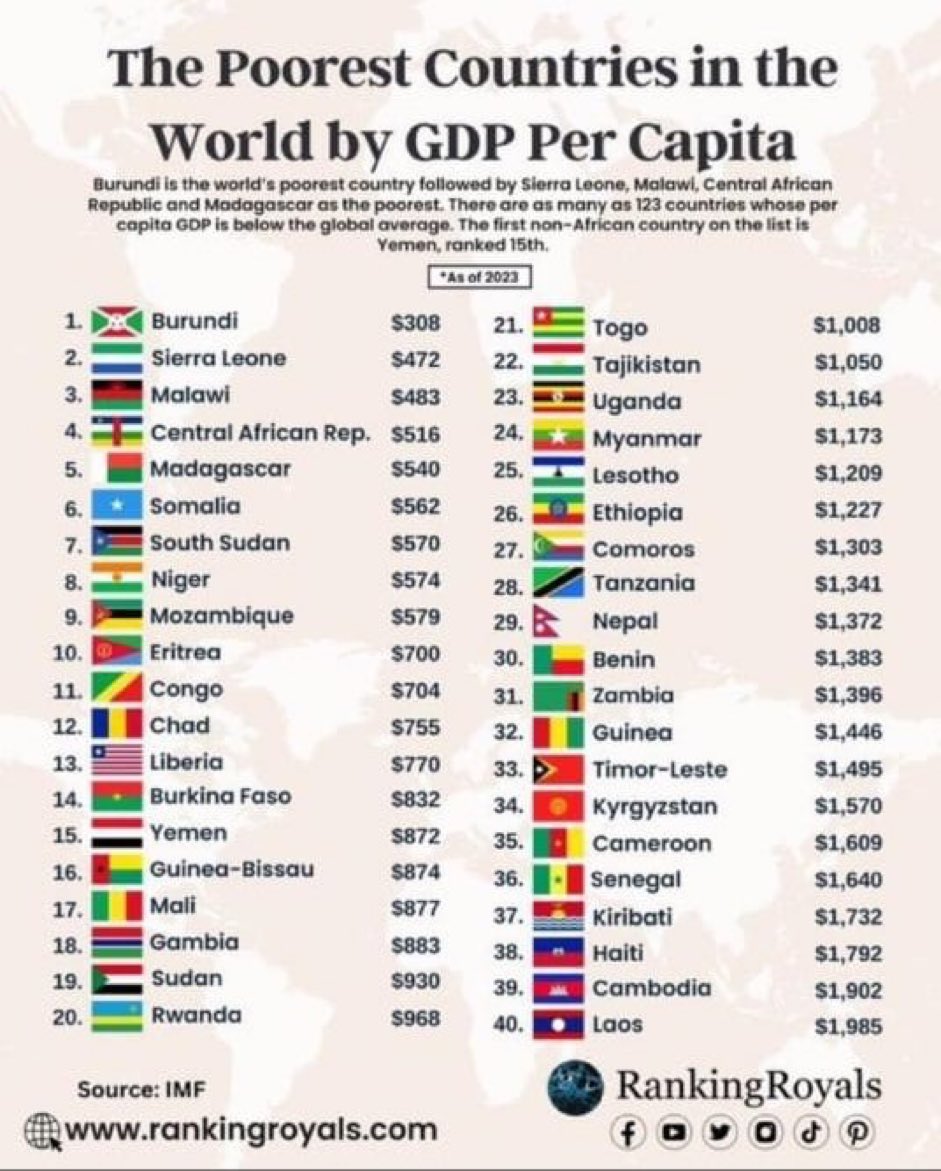
Trustworth Quality Bales 👚👖👗👕
Basa redu tinohodhesa mabhero, mabhero emhando yepamusoro nemutengo wakanaka. We have a good reputation and customer yatatanga kudealer nayo todealer in the long run because of customer loyalty. +263783405393
OpenControversy As Zimbabwe Is Excluded From List Of World's Poorest Nations

Retired Major Dr Anywhere Mutambudzi, Chief Director of Strategic Communications in the Presidential Communications Office of the President and Cabinet in Zimbabwe sparked a social media controversy by sharing the RankingRoyals report on the poorest countries. The report did not include Zimbabwe among the world’s poorest countries.
The report factored in the Gross Domestic Product (GDP) of various nations. GDP measures the total value of goods and services produced within a country’s borders over a specific period, typically a year. It is often seen as an indicator of an economy’s size and overall health, offering insights into economic activity, productivity, and living standards. However, it’s important to note that GDP alone does not encompass all aspects of an economy, such as income distribution, quality of life, or sustainability. Therefore, it is commonly used alongside other indicators to gain a more comprehensive understanding.
Dr Mutambudzi stated on X (formerly Twitter) that Zimbabwe’s exclusion from the list of poorest nations was due to President Emmerson Mnangagwa’s policies. He said:
If you wish Zimbabwe ill, you will likely review this attachment several times thinking you are missing something. It’s true, Zimbabwe is not on the list of group of countries that are classified as poorest as of 2023. This has been made possible by President @edmnangagwa’s policies of thinking outside the box to improve our collective well-being through homegrown solutions inspired by the philosophy Nyika Inovakwa neVene Vayo, this even in an environment of efforts to strangle the country through sanctions, themself a crime against humanity. It takes strong and visionary leadership in a dog-eat-dog global environment to achieve such a feat.

Journalist Hopewell Chin’ono rejected the report, stating that Zimbabwe is, in fact, in a worse condition than many of the countries listed. He said:
I am sorry to disappoint you @DrMutambudzi Zimbabwe is on that list, but because of our dysfunctional economy, many indices are dropping us. Zimbabwe is actually worse than many of those countries, see attached link below. In order for you to understand what I am saying, what is Zimbabwe’s GDP? End of story!
Chin’ono referred to a report from Global Finance magazine, which placed Zimbabwe at number 17 on the list of poorest countries worldwide, with a GDP-PPP of $2,627. The report explained that when determining the poorest countries, they consider GDP per capita as a standard metric but also account for differences in living costs and inflation rates by using purchasing power parity (PPP). They said this allows for a better assessment of an individual’s purchasing power in each country.
A higher GDP-PPP indicates a relatively higher standard of living, as individuals have more resources and buying power to meet their needs and desires. Conversely, a lower GDP-PPP suggests a lower average income and potentially limited access to goods and services.
The data used by Global Finance magazine was sourced from the International Monetary Fund’s World Economic Outlook report from April 2023.
The Zimbabwean economy started to fall behind South Africa and other SADC countries in the early 2000s. This decline was caused by various factors. Controversial land reform policies disrupted agricultural production, leading to a decline in output. Hyperinflation reached extreme levels, eroding the currency’s value and destabilising the economy. Political instability, including disputed elections, created an uncertain business environment. Economic mismanagement, such as excessive government spending and corruption, further contributed to the decline. Additionally, international sanctions imposed in response to human rights abuses and governance issues limited access to markets and foreign investment. These challenges, combined with limited credit access and infrastructure deficiencies, led to Zimbabwe’s economic decline.
The economic challenges in Zimbabwe had significant social impacts including increased poverty and income inequality, high unemployment rates, limited access to healthcare and education, emigration of skilled professionals, strained social services, and political and social tensions. Vulnerable populations were particularly affected by these challenges.
More Pindula News
Tags






